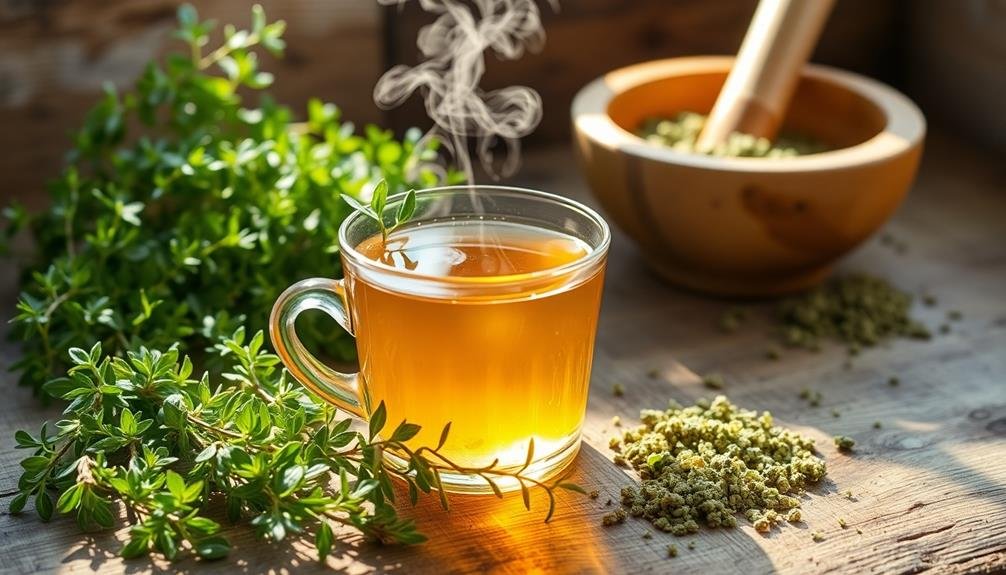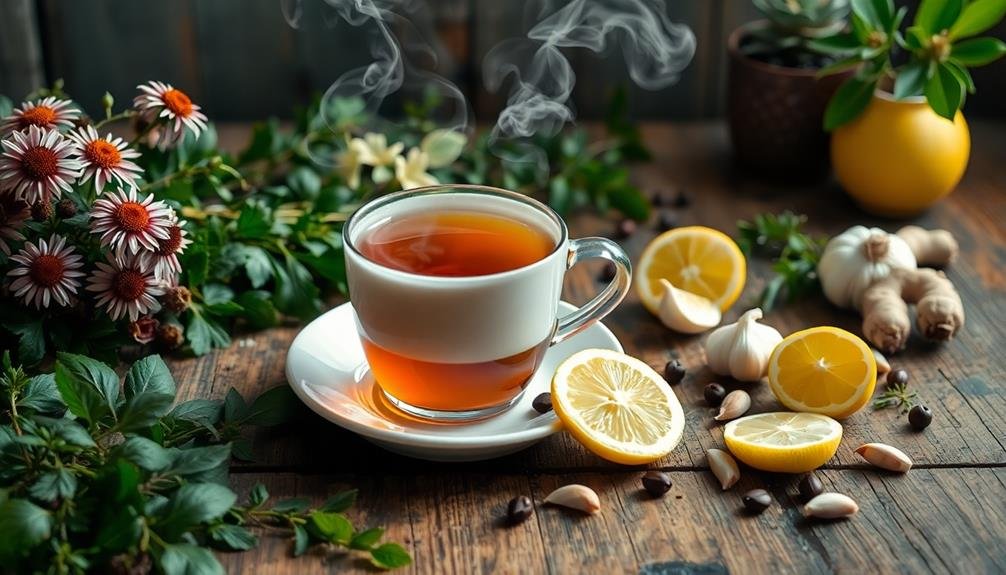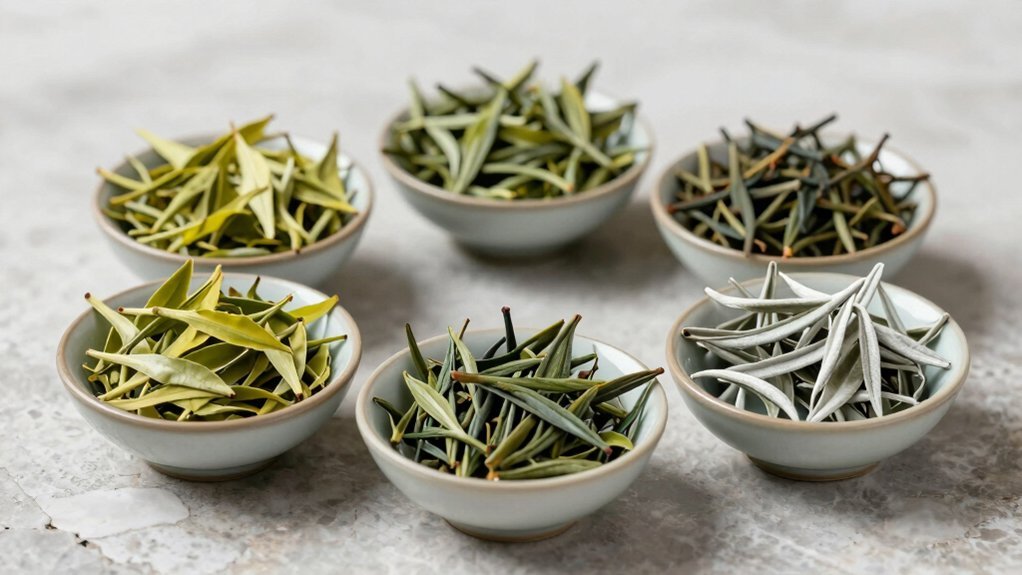Several potent antiviral herbs make excellent teas to boost your immune system and fight off infections. Elderberry tops the list with its ability to shorten flu symptoms and inhibit viral replication. Echinacea stimulates white blood cell production, while ginger's compounds effectively combat respiratory viruses. Licorice root contains glycyrrhizin, which inhibits multiple viruses, and astragalus enhances your body's natural defenses. Other powerful options include garlic, oregano, lemon balm, and peppermint. Each herb offers unique benefits, from reducing inflammation to soothing sore throats. By exploring these natural remedies, you'll discover a wealth of options to support your health during cold and flu season.
Elderberry: Nature's Antiviral Powerhouse

Elderberry stands out as one of nature's most potent antiviral herbs. It's packed with antioxidants and has been used for centuries to combat various illnesses, especially those caused by viruses.
When brewed into a tea, elderberry can provide a powerful boost to your immune system. Research has shown that elderberry can shorten the duration of flu symptoms and reduce their severity. It works by inhibiting the virus's ability to replicate, effectively stopping it in its tracks.
You'll find that elderberry tea not only tastes pleasant but also offers a range of health benefits beyond its antiviral properties.
To make elderberry tea, you can use dried berries or a pre-made syrup. Steep the berries in hot water for about 15 minutes, or mix the syrup with warm water. Add honey or lemon to taste.
It's best to drink this tea at the first sign of illness for maximum effectiveness.
Echinacea for Immune Support
Another powerful herb in the antiviral arsenal is Echinacea. This purple coneflower has been used for centuries to boost immune function and fight off infections. When brewed as a tea, Echinacea can help your body defend against viruses and reduce the severity and duration of colds and flu.
Echinacea works by stimulating the production of white blood cells, which are essential for fighting off pathogens. It's also rich in antioxidants that protect your cells from damage caused by free radicals.
You'll find that regular consumption of Echinacea tea can increase your body's natural resistance to infections.
To make Echinacea tea, steep 1-2 teaspoons of dried Echinacea root, leaves, or flowers in hot water for 10-15 minutes. You can drink this tea up to three times a day when you're feeling under the weather or as a preventive measure during cold and flu season.
For best results, combine Echinacea with other immune-boosting herbs like elderberry or ginger.
Ginger's Potent Antiviral Properties

Ginger stands out among the most potent antiviral herbs you can brew into a tea. This pungent root has been used for centuries in traditional medicine and modern research confirms its antiviral properties. Ginger contains compounds like gingerols and shogaols that have shown effectiveness against various viruses, including the common cold and flu.
When you brew ginger tea, you're extracting these beneficial compounds. They work by inhibiting viral replication and boosting your immune system. Ginger's antiviral effects are particularly potent against respiratory viruses, making it an excellent choice during cold and flu season.
To maximize ginger's benefits, steep fresh, grated ginger in hot water for at least 10 minutes. You can enhance its flavor and efficacy by adding lemon and honey. Drink this tea regularly to support your body's defenses against viral infections.
Beyond its antiviral properties, ginger tea offers additional health benefits. It can soothe sore throats, reduce inflammation, and aid digestion.
If you're feeling under the weather, a cup of ginger tea might be just what you need to give your immune system a boost and fight off those pesky viruses.
Licorice Root: Ancient Healing Herb
Why has licorice root been revered for thousands of years in traditional medicine? This ancient herb boasts powerful antiviral properties that make it a valuable addition to your tea arsenal. Licorice root contains glycyrrhizin, a compound that's been shown to inhibit the replication of various viruses, including influenza, hepatitis, and even HIV.
You'll find that licorice root tea offers more than just antiviral benefits. It's also known for its anti-inflammatory and immune-boosting properties, helping your body fight off infections more effectively. The herb can soothe sore throats and reduce coughing, making it an excellent choice when you're battling a cold or flu.
When brewing licorice root tea, steep 1-2 teaspoons of dried root in hot water for 5-10 minutes. You can enjoy it on its own or combine it with other antiviral herbs for a more potent blend.
However, be cautious with your intake, as excessive consumption can lead to side effects like increased blood pressure. It's best to limit your licorice root tea to no more than 2-3 cups per day and consult your healthcare provider if you have any underlying health conditions.
Astragalus: Boosting Natural Defenses

Astragalus, a staple in Traditional Chinese Medicine for centuries, stands out as a powerful immune-boosting herb. It's renowned for its ability to enhance your body's natural defenses against viruses and other pathogens. When brewed into a tea, astragalus can help fortify your immune system, potentially reducing the frequency and severity of common illnesses.
This adaptogenic herb works by stimulating the production of white blood cells, which are essential for fighting off infections. It's also rich in antioxidants, helping to protect your cells from damage caused by free radicals. Regular consumption of astragalus tea may contribute to overall health and longevity.
Here are some key benefits of astragalus:
- Enhances immune function
- Reduces inflammation
- Supports cardiovascular health
- Aids in stress management
- May have anti-aging properties
To make astragalus tea, simply steep dried root slices in hot water for 10-15 minutes. You can combine it with other immune-boosting herbs like echinacea or elderberry for a more potent blend.
While generally safe, it's always wise to consult with a healthcare professional before adding new herbal remedies to your routine, especially if you're pregnant, nursing, or taking medications.
Garlic: Pungent Antiviral Ally
Garlic isn't just for flavoring your food; it's a potent antiviral herb you can use in teas.
Its powerful antiviral properties make it an excellent choice for fighting off infections and viruses.
You'll also benefit from garlic's ability to boost your immune function, helping your body defend itself more effectively against pathogens.
Powerful Antiviral Properties
When it comes to powerful antiviral allies, garlic stands out as a pungent powerhouse. Its potent compound, allicin, is responsible for its impressive antiviral properties. You'll find that garlic can help fight various viruses, including those responsible for the common cold and flu.
To harness garlic's antiviral benefits, you can incorporate it into your daily routine in several ways:
- Add raw, crushed garlic to your meals
- Take garlic supplements
- Steep minced garlic in hot water for tea
- Use garlic-infused oils in cooking
- Mix raw garlic with honey for a natural remedy
Garlic's antiviral effects are most potent when consumed raw, as heat can decrease its effectiveness. However, even cooked garlic retains some of its beneficial properties.
You'll want to consume garlic regularly to maximize its immune-boosting potential.
Research has shown that garlic can enhance your body's natural defense mechanisms, stimulating the production of virus-fighting white blood cells.
It's also been found to reduce the severity and duration of cold and flu symptoms. By incorporating garlic into your diet, you're giving your immune system a powerful ally in the fight against viral infections.
Boosting Immune Function
Beyond its antiviral properties, garlic plays a key role in boosting your overall immune function. It contains compounds like allicin and sulfur that stimulate the production of white blood cells, your body's primary defense against infections.
These compounds also enhance the efficiency of existing immune cells, helping them identify and neutralize pathogens more effectively.
When you consume garlic regularly, you're not just fighting viruses; you're strengthening your entire immune system. It increases the activity of natural killer cells, which target and destroy virus-infected cells.
Garlic also reduces inflammation in your body, allowing your immune system to focus on combating external threats rather than dealing with internal issues.
To maximize garlic's immune-boosting benefits, try incorporating it into your daily diet. Add raw garlic to your meals, or steep crushed cloves in hot water for a potent tea.
You can also find garlic supplements if you're not fond of its taste. Remember, consistency is key – regular consumption will yield the best results in fortifying your immune defenses against various pathogens, including viruses.
Oregano's Powerful Medicinal Benefits

Oregano isn't just for pizza—it's a potent antiviral herb that can boost your immune system.
You'll find oregano's powerful compounds, like carvacrol and thymol, are effective against various viruses.
To harness oregano's benefits, brew a strong tea using 1-2 teaspoons of dried oregano leaves per cup of hot water, and drink up to three cups daily.
Oregano's Antiviral Properties
Among herbal powerhouses, oregano stands out for its potent antiviral properties. This Mediterranean herb contains compounds like carvacrol and thymol, which have been shown to inhibit various viruses. When you're brewing oregano tea, you're tapping into a natural antiviral arsenal that can help support your immune system.
Research suggests that oregano's antiviral effects may be particularly effective against respiratory viruses. It's been found to reduce viral activity and potentially shorten the duration of infections. While it's not a replacement for medical treatment, incorporating oregano tea into your wellness routine could provide additional support during cold and flu seasons.
Here are key antiviral benefits of oregano:
- Inhibits viral replication
- Boosts immune system function
- Reduces inflammation associated with viral infections
- Provides antioxidant support
- May help alleviate symptoms of respiratory infections
When preparing oregano tea, use fresh or dried leaves and steep for about 5-10 minutes. You can enhance its flavor and potential benefits by combining it with other antiviral herbs like echinacea or elderberry.
Boosting Immune System
A robust immune system is your body's first line of defense against pathogens, and oregano can play an essential role in strengthening it. This powerful herb contains compounds like carvacrol and thymol, which have been shown to stimulate the production of white blood cells and enhance overall immune function.
When you incorporate oregano into your diet or drink it as a tea, you're providing your body with a natural immune booster. Here's how oregano supports your immune system:
| Benefit | How It Works |
|---|---|
| Antioxidant Protection | Neutralizes free radicals |
| Anti-inflammatory Action | Reduces chronic inflammation |
| Antimicrobial Properties | Fights harmful bacteria and viruses |
Preparation and Dosage
Now that you understand oregano's immune-boosting potential, let's explore how to harness its powerful medicinal benefits through proper preparation and dosage.
To make oregano tea, steep 1-2 teaspoons of dried oregano leaves in a cup of hot water for 5-10 minutes. Strain and enjoy up to three times daily. For a stronger brew, use fresh oregano leaves, crushing them slightly to release more oils. You can also add honey or lemon to taste.
When using oregano oil, it's essential to dilute it properly. Mix 1-2 drops of oregano essential oil with a carrier oil like coconut or olive oil before applying topically or adding to your tea. Start with a lower dose and gradually increase as needed. Remember that oregano is potent, so moderation is key.
Here are some tips for incorporating oregano into your wellness routine:
- Use organic, high-quality oregano for maximum benefits
- Store dried oregano in an airtight container away from light and heat
- Experiment with different oregano varieties for unique flavors
- Combine oregano with other antiviral herbs for synergistic effects
- Consult a healthcare professional before using oregano medicinally, especially if pregnant or nursing
Lemon Balm for Viral Protection
Lemon balm, a fragrant herb from the mint family, has long been prized for its potential antiviral properties. You'll find it's particularly effective against herpes simplex virus types 1 and 2, which cause cold sores and genital herpes. Its active compounds, including rosmarinic acid and eugenol, work to inhibit viral replication and attachment to host cells.
To harness lemon balm's antiviral benefits, you can brew it as a tea or apply it topically as an essential oil. For tea, steep 2-3 teaspoons of dried lemon balm leaves in hot water for 10-15 minutes. Drink this tea 2-3 times daily for best results. When using it topically, dilute the essential oil in a carrier oil and apply it to affected areas.
| Lemon Balm Benefits | Usage |
|---|---|
| Antiviral | Tea, topical |
| Stress relief | Tea, aromatherapy |
| Digestive aid | Tea, capsules |
While generally safe, you should consult your healthcare provider before using lemon balm, especially if you're pregnant, breastfeeding, or taking medications. It may interact with sedatives and thyroid medications. Remember, while lemon balm can be a helpful addition to your antiviral arsenal, it shouldn't replace prescribed treatments for severe viral infections.
Peppermint: Cooling Antiviral Relief

Packed with potent antiviral compounds, peppermint offers a revitalizing approach to combating viral infections. Its active ingredients, including menthol and rosmarinic acid, work together to inhibit viral replication and boost your immune system.
When you brew peppermint tea, you're harnessing these powerful properties to fight off viruses and alleviate symptoms.
Peppermint's cooling effect can help soothe sore throats and reduce inflammation, making it an excellent choice for respiratory infections. It's also known to aid digestion, which can be beneficial when your body is fighting off a virus. The tea's invigorating taste and aroma can help clear your sinuses and provide a sense of relief.
Here are some key benefits of peppermint as an antiviral herb:
- Inhibits viral replication
- Boosts immune system function
- Reduces inflammation and soothes sore throats
- Aids digestion during illness
- Clears sinuses and provides respiratory relief
To make the most of peppermint's antiviral properties, steep fresh or dried leaves in hot water for 5-10 minutes. You can also combine it with other antiviral herbs like lemon balm or elderberry for a more potent brew.
Calendula's Immune-Enhancing Effects
Bursting with immune-boosting properties, calendula offers a potent defense against viral infections. This vibrant orange flower contains powerful flavonoids and triterpenes that stimulate your body's natural defense mechanisms. When brewed as a tea, calendula can help reduce inflammation, fight off viruses, and promote overall wellness.
You'll find that calendula tea has a mild, slightly sweet flavor with earthy undertones. To make the most of its antiviral benefits, steep 1-2 teaspoons of dried calendula flowers in hot water for 10-15 minutes. Drink this tea 2-3 times daily during cold and flu season to strengthen your immune system.
| Benefit | How It Works |
|---|---|
| Antiviral | Inhibits viral replication |
| Anti-inflammatory | Reduces swelling and pain |
| Immune-boosting | Stimulates white blood cell production |
Calendula's immune-enhancing effects extend beyond its antiviral properties. It's also known for its ability to promote skin health and wound healing. You can apply cooled calendula tea topically to soothe minor skin irritations or use it as a gargle for sore throats. With its versatile applications and potent antiviral properties, calendula is an excellent addition to your herbal tea arsenal for maintaining peak health and fighting off infections.
Thyme: Aromatic Antiviral Herb

Thyme, a fragrant Mediterranean herb, packs a powerful antiviral punch in a small package. This aromatic herb contains thymol, a potent compound known for its antiviral properties. When you brew thyme tea, you're not only enjoying a flavorful beverage but also harnessing its ability to combat various viruses.
Research suggests that thyme can be effective against several types of viruses, including those responsible for respiratory infections. It's particularly useful during cold and flu season, as it may help reduce the severity and duration of symptoms.
Thyme's antiviral properties extend to its essential oil form, which you can use for inhalation or in a diffuser to purify the air.
Here are some key benefits of thyme as an antiviral herb:
- Contains thymol, a powerful antiviral compound
- Supports respiratory health
- May shorten the duration of viral infections
- Boosts overall immune function
- Offers additional antimicrobial properties
To make thyme tea, steep 1-2 teaspoons of dried thyme in hot water for 5-10 minutes. You can add honey or lemon to enhance the flavor and boost its antiviral effects.
Incorporate thyme tea into your daily routine for its delicious taste and potential health benefits.
Rosehip: Vitamin C-Rich Infusion
Rosehip tea offers potent immune-boosting properties due to its high vitamin C content.
You'll benefit from its antioxidant and anti-inflammatory effects by steeping 1-2 teaspoons of dried rosehips in hot water for 10-15 minutes.
For best results, you can drink 1-3 cups of rosehip tea daily, especially during cold and flu season.
Immune-Boosting Properties
Why is rosehip tea so highly regarded for its immune-boosting properties? It's primarily due to its exceptionally high vitamin C content, which is vital for maintaining a robust immune system. Rosehips contain up to 40 times more vitamin C than oranges, making them a powerhouse for fighting off infections and supporting overall health.
When you drink rosehip tea, you're not just getting vitamin C. You're also benefiting from a range of other immune-boosting compounds, including:
- Flavonoids: Powerful antioxidants that protect cells from damage
- Polyphenols: Plant compounds that reduce inflammation
- Carotenoids: Precursors to vitamin A, essential for immune function
- Vitamins E and B: Support various bodily functions, including immunity
- Minerals: Such as iron, calcium, and magnesium, which contribute to overall health
These components work synergistically to enhance your body's natural defenses.
Regular consumption of rosehip tea can help strengthen your immune system, potentially reducing the frequency and severity of colds and flu. It may also aid in faster recovery from illnesses.
Preparation and Dosage
Brewing a cup of rosehip tea is a simple process that maximizes its vitamin C content. To prepare, use 1-2 teaspoons of dried rosehips per cup of boiling water. Steep for 10-15 minutes, then strain and enjoy. You can drink rosehip tea hot or cold, and it's safe to consume up to 3 cups daily.
For ideal antiviral benefits, consider the following dosage guidelines:
| Purpose | Dosage |
|---|---|
| General health | 1 cup daily |
| Immune support | 2 cups daily |
| Cold/flu relief | 3 cups daily |
| Vitamin C boost | 2-3 cups daily |
| Stress relief | 1-2 cups daily |
Remember that rosehip tea is generally safe, but it's best to start with a lower dose and gradually increase. If you're pregnant, nursing, or taking medications, consult your healthcare provider before adding rosehip tea to your routine. To preserve the tea's potency, store dried rosehips in an airtight container away from light and heat. You can also make a large batch and store it in the refrigerator for up to 3 days, reheating as needed.
Hibiscus: Tangy Antiviral Brew

Among the vibrant and flavorful antiviral herbs, hibiscus stands out with its tangy taste and potent health benefits. You'll find this crimson flower not only adds a delightful tartness to your tea but also packs a punch against viral infections.
Hibiscus tea can help boost your immune system and fight off common viruses like influenza. To brew a perfect cup of hibiscus tea, steep 1-2 teaspoons of dried hibiscus flowers in hot water for 5-10 minutes. The longer you steep, the stronger and more tart the flavor becomes. You can enjoy this revitalizing beverage hot or iced, and it's caffeine-free, making it suitable for any time of day.
Here's why you should consider adding hibiscus to your antiviral tea rotation:
- Rich in vitamin C and antioxidants
- May lower blood pressure and cholesterol levels
- Supports liver health and function
- Possesses antimicrobial properties
- Can aid in weight management
Frequently Asked Questions
Can Pregnant Women Safely Consume Antiviral Herbal Teas?
You should consult your healthcare provider before consuming antiviral herbal teas during pregnancy. Some herbs can be harmful to your baby or cause complications. It's best to err on the side of caution and get professional advice.
How Often Should I Drink Antiviral Teas for Maximum Effectiveness?
You'll want to drink antiviral teas 2-3 times daily for the best results. It's important to be consistent, so try incorporating them into your routine. Don't overdo it, though – moderation is key for your body's balance.
Are There Any Potential Side Effects of Consuming Antiviral Herbal Teas?
While generally safe, you may experience side effects from antiviral herbal teas. You could have allergic reactions, stomach upset, or interactions with medications. It's best to consult your doctor before regularly consuming these teas, especially if you're pregnant or nursing.
Can Antiviral Herbal Teas Interact With Prescription Medications?
Yes, antiviral herbal teas can interact with prescription medications. You should always consult your doctor before consuming them regularly. They might affect how your body processes certain drugs or interfere with their effectiveness. Don't risk your health.
How Long Do the Antiviral Effects of These Teas Last?
You'll find that the antiviral effects of herbal teas typically last for a few hours after consumption. However, it's crucial to recognize that the duration can vary depending on the specific herb and your individual metabolism.
In Summary
You've now discovered some of nature's most potent antiviral herbs for tea. By incorporating these into your daily routine, you'll boost your immune system and help ward off viral infections. Remember, while these herbs can be powerful allies, they're not substitutes for medical care. Always consult your healthcare provider before starting any new herbal regimen, especially if you're pregnant, nursing, or taking medications. Stay healthy and enjoy your antiviral brews!





Leave a Reply